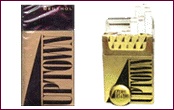Uptown cigarettes
{{#badges: Tobaccowiki}}
Uptown was a mentholated cigarette brand designed and targeted specifically to African American smokers in the U.S. by the R.J. Reynolds Tobacco Company in 1989. RJR addressed every detail in designing the cigarette, its packaging and marketing strategies. For example, the package was designed with black and gold colors that were deemed attractive to the African American market; the cigarettes were packed with the filters down, the opposite of standard packaging. Through focus group testing, RJR found that African American blue collar workers often opened their cigarettes from the bottom to avoid crushing the filters or putting unwashed hands on the part of the cigarette that goes into their mouth. RJR also planned to introduce the brand during February of 1989, timing which coincided with Black History Month.
A 1989 RJR press release about the brand stated,
We expect Uptown to appeal most strongly to black smokers," said Lynn B. Beasley, vice president of strategic marketing for Reynolds Tobacco. Black smokers show a strong preference for menthol brands. Our research leads us to believe that Uptown's blend of both traditional tobacco taste and refreshing menthol flavor will be an appealing alternative to smokers currently choosing a competitive brand," Beasley said.[1]
Advertising for Uptown feature Black models enjoying city nightlife and read "Uptown. The Place. The Taste." The marketing plan RJR devised for Uptown was designed to take advantage of media that was particularly effective at reaching Blacks, like billboards, transit advertising, bus shelters, point-of-purchase signs and ads in Black-oriented newspapers and magazines. [2] While some Black media were concerned about the issue, most were appreciative of the opportunity for advertising revenues. However, as protests of the brand became more numerous, these publications faced the difficult decision of whether to carry the advertising or not.
Uptown protests
In a move that was unprecedented at the time, on January 18th, 1990, then-Secretary of Health and Human Services Louis Sullivan spoke out publicly against Uptown in Philadelphia. Sullivan condemned RJR's strategy of targeting African Americans and expressed alarm and anger at RJR's plan. Sullivan also wrote to RJR CEO James Wesley Johnston expressing his concern and urging the company to cancel its plans to market Uptown. Sullivan's action received extensive national media coverage.
Meanwhile, in Philadelphia, the site of the cigarette brand's initial rollout, a coalition of Black community leaders formed to fight Uptown. Called Coalition Against Uptown Cigarettes, the group was comprised of about 35 community leaders representing the Conference of Black Clergy, the American Lung Association, the American Cancer Society, the Delaware Valley Hospital Council and Black United Methodist Preachers. The coalition held a press conference and rally at the Zion Baptist Church on January 29th, 1990 to protest the introduction of Uptown and urge community members not to buy or accept free samples of Uptown cigarettes. As far away as Colorado, the Colorado Task Force on Cancer Among Blacks also protested the introduction of Uptown. These organized national protests against the cigarette by Blacks was cited as the best response to RJR's claim that those who oppose the marketing of Uptown to the Black community are racist.[3]
Resolution
Ultimately, RJR withdrew Uptown prior to the rollout, in the face of all the protests.[4]
Related Sourcewatch resources
References
- ↑ R.J. Reynolds WINSTON-SALEM, N.C. -- Uptown, a premium menthol cigarette that provides a distinctive balance of menthol and tobacco taste, will be introduced by R.J. Reynolds Tobacco Co. into test market in Philadelphia on Feb. 5 Press release. 3 pp. 1989 Bates No. 507168630/8632
- ↑ Advocacy Institute RJ Reynolds New "Uptown" Targets BlacksNewsletter/publication. January 19, 1990. Bates No. 980120794/0797
- ↑ Charyn Sutton, The onyx Group The Coalition Against Uptown Cigarettes: Marketing Practices and Community Mobilization November 21, 1993.
- ↑ Advocacy Institute RJR Withdraws Plan to Test Market "Uptown" In Philadelphia Newsletter. 4 pp. January 22, 1990. Bates No. 980120787/0792
